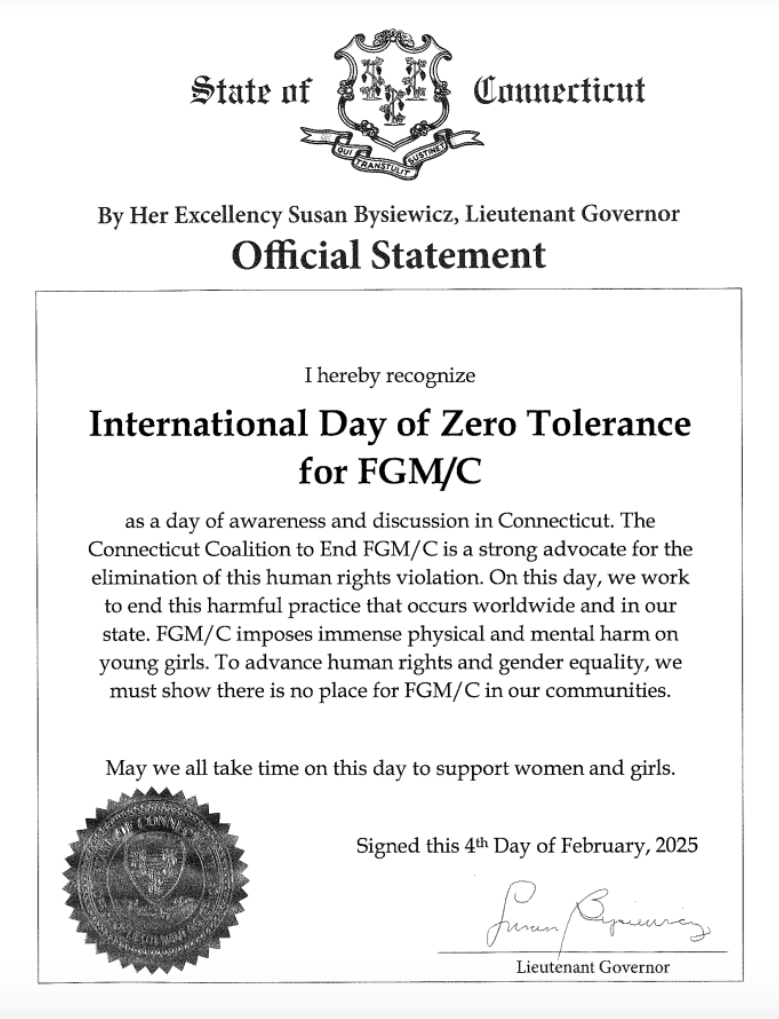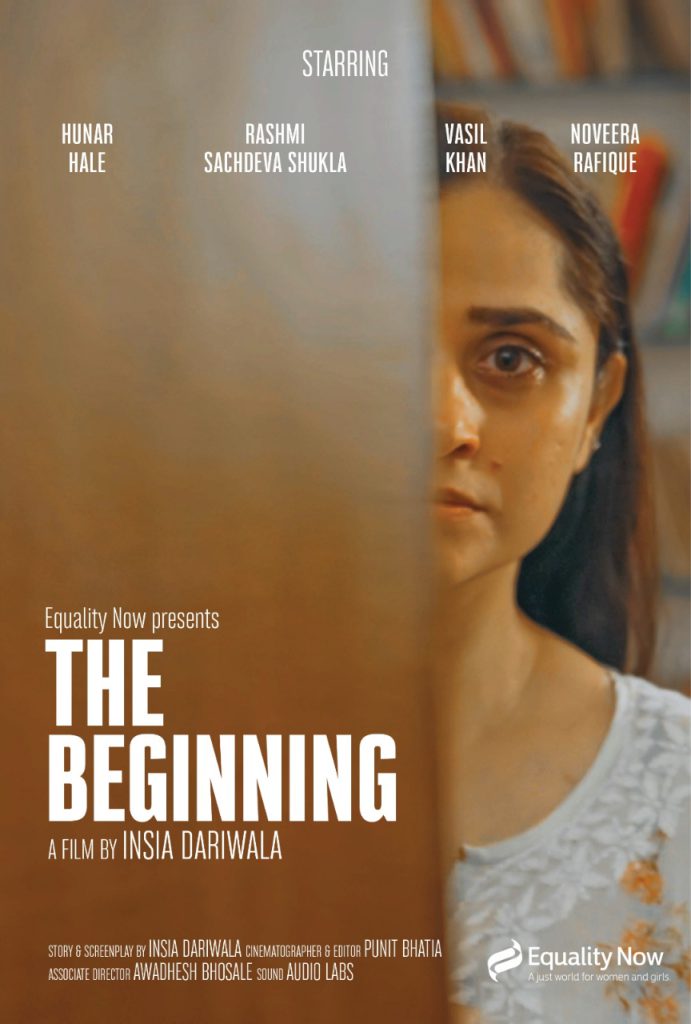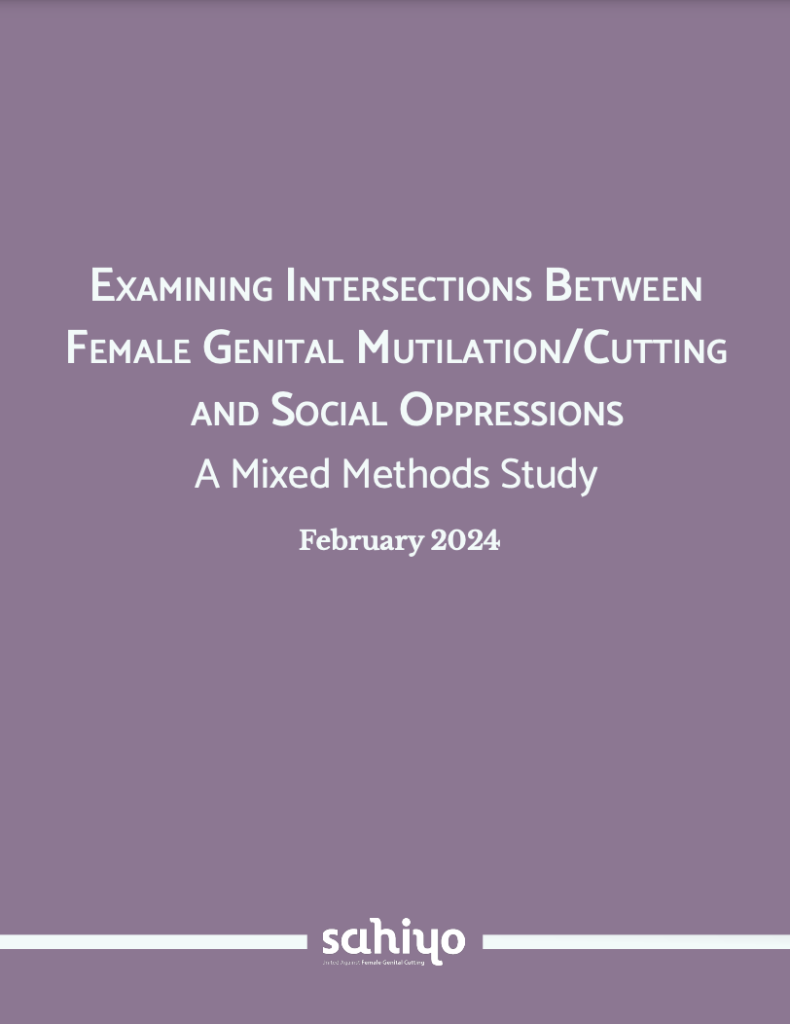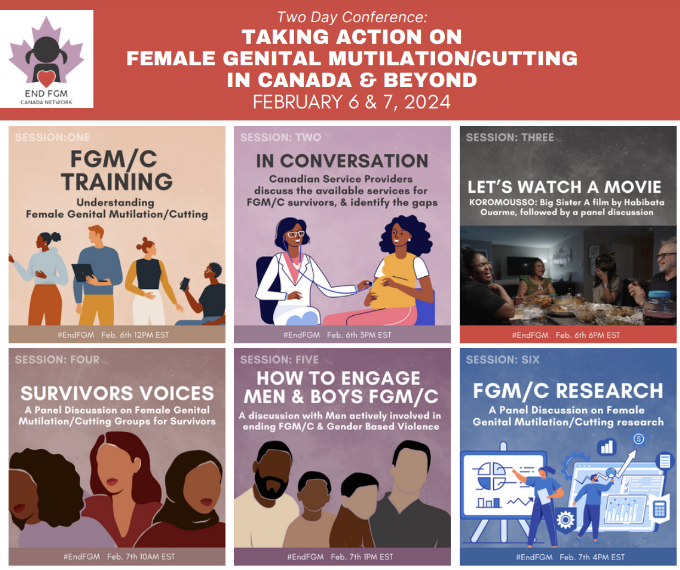Legislative Updates: Connecticut Moves Closer to Passing a Bill to Support Survivors of Female Genital Cutting

It’s been a busy year so far in Connecticut when it comes to advocating to end female genital cutting, (FGC)! Here are some updates we’d like to share with you all: Legislative Developments On February 4th, in honor of International Day of Zero Tolerance for Female Genital Mutilation/Cutting (FGM/C), State Representative Jillian Gilchrest and State Representative Nicole Klarides-Ditria along with the Connecticut Coalition to End FGMC held a press conference to raise awareness about FGM/C and introduce House Bill 6596: An Act Concerning The Prevention Of Female Genital Mutilation. This proposed bill aims to establish educational programs, provide civil remedies for survivors, and prohibit FGM/C in the state. Connecticut remains one of only nine states without legislation protecting children from FGM/C. Here’s what one of the event speakers, Zehra Patwa, had to say about the press conference: “It was an honor to be invited to share my experience as a survivor at a press conference at the State Capitol on February 4, 2025, in recognition of International Day of Zero Tolerance of FGM/C. Since discovering in my 40s that I was cut as a child, I have worked to ensure no other girls go through what I, and so many other girls in communities who practice FGM/C, went through. I thank Lt Governor Susan Bysiewicz, chair of the Governor’s Council on Women and Girls, and Rep Gillian Gilchrest, along with all the sponsors of bill 6596, who have lent their unwavering support to end this harmful cultural practice on girls in Connecticut. It is comforting to me that this bill has bipartisan support through the tireless efforts of the Coalition to End FGM/C and I beg the House to pass this bill as soon as possible so that not one more girl has to live with the trauma that FGM/C can cause. Because one girl cut is one too many.” The bill has now made its way to the Joint Committee on Judiciary, a crucial step in ensuring legal protections are put in place for FGC survivors and at-risk individuals. Recognizing The International Day of Zero Tolerance for FGM/C Connecticut’s Lieutenant Governor Susan Bysiewicz, a strong advocate for passing legislation on this critical issue of FGM/C, and who also attended and spoke at the Feb 4th Press conference presented, shared with the public that her office had issued a citation recognizing February 6th as International Day of Zero Tolerance for FGM/C. This citation also commended the work of the Connecticut (CT) Coalition to End FGM/C, of which Sahiyo is a founding member, and it acknowledged our coalition’s ongoing advocacy efforts to urge collective action to protect women and girls from FGM/C. The Governor of Connecticut, Ned Lamont, also issued a Proclamation from his office, which Bysiewicz presented to the crowd at the press release as well. Moving Forward Ahead of the public hearing for the Joint Judiciary Committee, date yet to be set, our Coalition is urging Connecticut lawmakers to support passage of House Bill 6596, ensuring that this legislation moves forward into law. We also call on Connecticut residents to join the movement to protect women and girls from FGM/C by signing our Call to Action to urge your Connecticut representatives to sponsor and support this bill.
Uniting to End FGM/C Across the Americas: A Joint Statement

This February 6th – International Day of Zero Tolerance for Female Genital Mutilation/Cutting, in recognition of this year’s theme – “Stepping Up the Pace. Strengthening Alliances and Building Movements to End FGM,” we are delighted to announce the formation of the Americas Alliance to End FGM/C. The Americas Alliance will serve as a coalition of organizations, governments, researchers, activists, and survivor advocacy groups, dedicated to ending female genital mutilation/cutting (FGM/C) across the Americas. Recognizing FGM/C as a severe violation of human rights and a form of gender-based violence (GBV), the Alliance aims to unify efforts to support survivors, enhance prevention strategies, and promote gender equality throughout the region. FGM/C impacts communities worldwide, including across North and South America, though misconceptions lead to falsely believing the Americas are immune from this form of gender-based violence. The latest data shows us that there may be over 700,000 women and girls across the United States and Canada affected by or at risk of FGM/C. FGM/C also continues to be reported in Colombia, where a bill has recently been introduced to combat the harmful practice. There is also historical evidence of FGM/C being practiced in Mexico, Brazil and Peru which requires further investigation to determine current practice. From survivors living with its physical and psychological consequences to girls at risk, FGM/C transcends borders and cultures, demanding a unified, coordinated, and survivor-centered response. 1 Recognizing this need, we are proud to support the creation of the Americas Alliance —a collaborative network dedicated to addressing FGM/C through cross-border cooperation, shared knowledge and resources, and survivor-informed approaches. By bringing diverse voices and expertise together, the Americas Alliance aims to build capacity, amplify advocacy, and create lasting change. Participants: The founding organizations of the Americas Alliance include The U.S. End FGM/C Network, the End FGM Canada Network, George Washington University, Equality Now, and Sahiyo U.S. The Americas Alliance will also involve additional diverse groups of stakeholders dedicated to ending FGM/C and supporting survivors across the Americas. The partners whom the Alliance will collaborate and engage with will include: Service-providing organizationsExamples: Grassroots NGOs, community health organizations, and social service providers working directly with FGM/C survivors. Government representativesExamples: Government and intergovernmental development agencies and departments. ResearchersExamples: Academic institutions, public health researchers, gender studies scholars, and independent experts focused on FGM/C. ActivistsExamples: Survivor-led advocacy groups, grassroots organizers, human rights defenders, and gender justice advocates. And moreExamples: International organizations, private sector partners, legal advocates, faith-based organizations. Our Shared Commitment As participants of the Americas Alliance, we are dedicated to: Enhance data collection and knowledge sharing by establishing a robust framework for collecting and sharing data across countries, improving the accuracy of FGM/C prevalence estimates, and understanding its impact throughout the Americas. Develop trauma-informed, culturally sensitive support systems by facilitating the creation of transnational support networks that are responsive to the cultural and holistic health needs of survivors. Strengthen prevention strategies and policy frameworks by promoting the exchange of best practices and successful prevention models from diverse contexts within the Americas. Coordinate consistent, survivor-centered communications by ensuring that messaging and communications around FGM/C align across the region, maintaining accuracy, and respect for the lived experiences of survivors. If you wish to learn more about the Americas Alliance to End FGM/C, please contact us at americasalliance@endfgmnetwork.org. 1 Efforts are aligned with key Sustainable Development Goals (SDGs), including SDG 3 (Good Health and Well-being), SDG 5 (Gender Equality), and SDG 17 (Global Partnerships).
Connecticut’s Lieutenant Governor Recognizes International Day of Zero Tolerance for FGM/C

The Connecticut (CT) Coalition to End FGM/C, of which Sahiyo is a founding member, is so pleased to see that Connecticut’s Lieutenant Governor Susan Bysiewicz has issued a citation to recognize February 6th as International Day of Zero Tolerance for FGM/C, a day to “take time to support women and girls” and end this harmful form of gender-based violence. In the citation, the Lieutenant Governor uplifts the ongoing efforts of the Connecticut Coalition to End FGM/C to protect women and girls from female genital mutilation/cutting (FGM/C). This recognition comes as the CT Coalition renews our push for passage of House Bill 6596 in the 2025 legislative session. The bill aims to establish educational programs, provide civil remedies for survivors, and criminalize FGM/C in the state. Connecticut remains one of only nine states without legal protections against this harmful practice. This citation serves as a meaningful acknowledgment of the work our coalition has done to raise awareness, advocate for policy changes, and support survivors in Connecticut. We are grateful for this public awareness and see it as a reminder of the importance of continuing the CT Coalition’s mission to ensure that every child in the state is protected from FGM/C. A special thank you to all the advocates, community members, and partners who stand with us in this effort. We invite you to join us by continuing to raise awareness and support legislation to protect women and girls by signing our Call to Action and urging your CT representatives to ban FGM/C. Stay tuned for more updates on House Bill 6596 and upcoming advocacy initiatives.
Equality Now releases the trailer of Asia’s first fiction film on FGM/C, directed by Sahiyo co-founder, Insia Dariwala

On International Day of Zero Tolerance for Female Genital Mutilation, Equality Now — an NGO that advocates for the rights and protection of women and girls around the world — released the trailer for “The Beginning.” Written and directed by Sahiyo’s co-founder Insia Dariwala, it’s the Asian continent’s first ever fiction film on Female Genital Mutilation/ Cutting (FGM/C). Inspired by real survivors who underwent FGM/C as little girls, the film highlights the trauma many struggled with, long after the cut. Equality Now’s Global Leader, Divya Srinivasan, who worked with Insia on producing the film said, “We believe that this thought-provoking piece evocatively demonstrates the struggles faced by a woman holding the dual experiences of being a survivor herself, while also being a mother who is expected to play a major role in continuing the practice with future generations.” She also writes, “Since survivors of FGM/C in India broke the silence about this practice over seven years ago, there have been great strides towards prevention and eradication of FGM/C. The issue of FGM/C in India has been recognised in the Supreme Court and at international bodies; and there is greater awareness on the patriarchal nature and harmful effects of the practice within practicing communities, particularly amongst the younger generation. However, we have a long way to go in the struggle to end FGM/C and we need more public conversations to change hearts and minds of all stakeholders, and prevention and response initiatives to ensure that we can move towards the goal of eradication.In partnership with Insia and Sahiyo, we hope that we can use this film to raise awareness on FGM/C in the country, particularly with young people; and to highlight FGM/C as a priority human rights issue that needs to be addressed by a range of stakeholders including the international community, medical associations, and CSOs working on ending gender-based violence in India.”
Zero Tolerance Day 2024: Her Voice, Her Future

On February 13th, the World Bank invited Sahiyo to host a screening of the Voices to End FGM/C Digital Storytelling Project in honor of International Day of Zero Tolerance for Female Genital Mutilation/Cutting. During the virtual event, attendees from around the world watched nine videos from Voices to End FGM/C collection including videos from U.S. Executive Director Mariya Taher, and alumni Severina Lemachokoti and Renee Bergstrom. Afterward, all three discussed the healing nature of sharing one’s story, the challenges that come from speaking up, and the overall advocacy that is done to end FGM/C. To watch Severina’s digital story, click here. To watch Renee’s digital story, click here.
Milken Institute School of Public Health, Sahiyo, and other Community Partners Receive DOJ Grant to end FGC

Sahiyo U.S. is pleased to announce we’ve been awarded a grant alongside George Washington University’s Milken Institute School of Public Health, U.S. End FGM/C Network, and Global Woman PEACE Foundation from the Department of Justice’s Office on Violence Against Women (OVW) to develop training programs, prevention strategies, and education on FGM/C. “FGM/C is an issue I’ve known about my entire life.This partnership between our various organizations highlights something as a child I never thought possible, a public recognition that FGM/C is a concern in the U.S.,” said Mariya Taher, Executive Director of Sahiyo U.S. “It is significant that the OVW is recognizing the importance of addressing FGM/C in the United States, and that understanding its intersections with other forms of violence against women is crucial,” said Caitlin LeMay, the Executive Director of the U.S. End FGM/C Network. Read the full article here.
Sahiyo releases new research report on February 6th

Sahiyo U.S. is excited to announce the publication of Examining Intersections Between Female Genital Mutilation/Cutting And Social Oppressions: A Mixed Methods Study, the second of three reports from our Critical Intersections Research Project. Inspired by our 2021 webinar, and building upon themes derived from our initial body of work released in 2023, this new report is based on original research from a mixed-methods survey with over 100 respondents, including individuals and organization that work within and beyond the FGM/C sphere. We are proud to share this report on February 6th, International Day of Zero Tolerance for FGM/C, as part of our survivor and advocate-led original research project. The report examines two main forms of oppressions intersecting with FGM/C: systemic forces, including discrimination within institutions, as well as interpersonal and communcal factors, such as discrimination within practicing communities and the anti-FGM/C movement itself. This body of work also identifies challenges and opportunities for cross-collaboration with other social justice movements and provides recommendations for how to implement this intersectional work. This research is meant to support advocates working in FGM/C to better understand how these intersecting oppressions affect the movement to end FGM/C, and connect fellow activists and social change makers to understand the larger forms of inequity at play and unite in ending these universally oppressive systems. We aim to strengthen anti-FGM/C efforts by addressing the roots of inequity and inequality and to create stronger collaborative movements across various human rights issues. Read the report here. Learn more about the Critical Intersections Research Project here.
Milken Institute School of Public Health Joins Sahiyo U.S. and Other Community Partners in Receiving $300,000 DOJ Grant to Prevent Female Genital Mutilation/Cutting

WASHINGTON, DC – (February 6, 2024) – The Milken Institute School of Public Health alongside its community partners announced today they received a $300,000 grant from the Department of Justice’s Office on Violence Against Women (OVW) to provide training and technical assistance focused on the prevention and response to female genital mutilation/cutting (FGM/C) to community-based organizations across the United States working to end violence. “Two hundred million women worldwide have experienced FGM/C, with 3-4 million girls affected every year,” said Karen A. McDonnell, Associate Professor in the Department of Prevention and Community Health at the George Washington University Milken Institute School of Public Health. “That’s only in the countries we know about. In the United States, over a half-million girls and women are affected by, or at risk for, FGM/C and it is important that FGM/C is recognized as a prevalent form of gender-based violence worldwide.” Dr. McDonnell will serve as the principal investigator on the project. The team assembled to address this project is a cooperative of partners that includes: The U.S. End FGM/C Network, the Global Woman PEACE Foundation, Sahiyo US, and the GW Milken Institute School of Public Health. “It is significant that the OVW is recognizing the importance of addressing FGM/C in the United States, and that understanding its intersections with other forms of violence against women is crucial,” said Caitlin LeMay, the Executive Director of the U.S. End FGM/C Network. Sahiyo co-founder Mariya Taher —who has been recognized by L’Oreal Paris as a 2023 Women of Worth and a leading advocate in the field of FGM/C — shared her own excitement about the partnership. “FGM/C is an issue I’ve known about my entire life having grown up in a community in which it was practiced. This partnership between our various organizations highlights something as a child I never thought possible, a public recognition that FGM/C is a concern in the U.S., and that for us to prevent the next generation from undergoing it, we have to work in a multisectoral way that partners the government with community-based organizations, with the advocates and the survivors who have the expertise on how to address this issue.” Throughout the project, the team will conduct listening sessions, provide training and technical assistance, and coordinate on the creation of online resources that can be utilized to increase the capacity of care given to FGM/C by other community service providers across the U.S. These resources will help victim service organizations and allied stakeholders recognize and address FGM/C in their provision of services. “We will explore how we can best meet the needs and build upon the strengths of service providers who may not even realize that the people they seek to help have experienced this trauma,” Angela Peabody, the Executive Director and Founder of the Global Woman PEACE Foundation.
Sahiyo publishes second report from Critical Intersections Research Project

Sahiyo U.S. is excited to announce the publication of Examining Intersections Between Female Genital Mutilation/Cutting And Social Oppressions: A Mixed Methods Study, the second of three reports from our Critical Intersections Research Project. Inspired by our 2021 webinar, and building upon themes derived from our initial body of work released in 2023, this new report is based on original research from a mixed-methods survey with over 100 respondents, including individuals and organization working within and beyond the FGM/C sphere. We are proud to publish this report, as part of a survivor and advocate-led original research project, on February 6th, International Day of Zero Tolerance for FGM/C. The report examines two main forms of oppressions intersecting with FGM/C: Systemic forces, such as discrimination within systems and institutions, included intersections between several forms of oppression such as xenophobia and racism with institutions like law enforcement. Many survey participants identified fear of the criminal justice system as a challenge for survivors and the end FGM/C movement; interestingly, a majority of every group reported to work with the legal system and law enforcement (in and beyond the FGM/C sphere). Interpersonal and communal forces, such as discrimination from within practicing communities and the movement to end FGM/C, introduced complexities for survivors and activists alike. Interestingly, individuals working in the FGM/C sphere most commonly identified interpersonal challenges (rather than systemic forces) such as gender discrimination and other forms of gender-based violence as challenges that girls and women in FGM/C-practicing communities face. Additonally, a strong discord around the framing of FGM/C (‘mutilation’ vs. ‘cutting’) suggested a significant barrier to collaborating within the FGM/C sphere and beyond. Lastly, the study examined the potential for cross-collaboration between the anti-FGM/C sphere and other social justice movements. Though participants reported an overwhelming desire for cross-collaboration across the demographic groups, they also identified many significant challenges for meaningful cross-collaboration. Participants also provided opportunities for collaboration. From the various challenges, opportunities, and intersections of oppressions, eight recommendations for cross-sector collaboration and intersectional work involving how to work toward ending FGM/C were gathered. This research is meant to support advocates working in FGM/C to better understand how these intersecting oppressions affect the movement to end FGM/C, and connect fellow activists and social change makers to understand the larger forms of inequity at play and unite in ending these universally oppressive systems. We aim to strengthen anti-FGM/C efforts by addressing the roots of inequity and inequality and creating stronger collaborative movements across various human rights issues. A special thank you to the Wallace Global Fund for funding this project! Read the full report here.
Upcoming conference on ending FGM/C in Canada

On February 6th & 7th, the End FGM Canada Network will be hosting a conference, Taking Action on Female Genital Mutilation/Cutting in Canada & Beyond. This conference aims to observe February 6th, The International Day of Zero Tolerance for Female Genital Mutilation, through two days of collective action. Sahiyo U.S. Executive Director Mariya Taher will be a panelist for the fourth session: Survivors Voices: A Panel Discussion on Female Genital Mutilation/Cutting for Survivors on Feb 7th at 10 am EST. The Network invites participants to join in taking a deep dive into the issue of female genital mutilation/cutting (FGM/C) and develop the understanding and skills needed to support FGM/C survivors and contribute to Canada’s anti-FGM/C movement. Learn more about the conference here.
